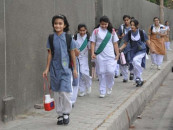Is a lack of family planning the cause of many socio-economic, terrorist evils in Pakistan?
‘The population boom magnified problems from maternal mortality to terrorism’.

Is a lack of family planning the cause of many socio-economic, terrorist evils in Pakistan?
The repercussions of the population boom have magnified into multiple socio-economic problems from spiralling child and maternal mortality to rising inflation and the spread of terrorism, argue the experts.
Today not only is Bangladesh’s currency stronger but its exports, in many commodities, far supercede Pakistan’s. Even its health indicators have improved with remarkable control over infectious diseases to the eradication of polio. How did the situation change so drastically in 30 years? Experts say it has a great deal to do with the Bangladeshi government’s commitment to control its population, ensuring healthy and ‘wanted’ children were born into families.
On the other side of the border, Pakistan is looking at a tidal wave of problems with a robust population and no contingency plans for their food, shelter, education or employment. Worse still, if something is not done to rectify the situation soon, “the next wave will be a tsunami leading to huge social dislocation,” according to the chief executive of Marie Stopes International, Dana Hovig.
“Leaders in many countries find scapegoats to deny responsibility,” Hovig told The Express Tribune in an exclusive interview during his brief stay in Karachi. “In India the government took responsibility and focused on the issue, Pakistan needs to do the same.”
Pakistan has a 25% un-met need for family planning. This means over 10 million women in this country want to use contraceptives but do not have access to them. As a result, women are unable to practice birth-spacing or giving adequate time between babies. Doctors recommend at least two years, between children.
“If we just focus on meeting the demand of these women [who want to use contraceptives] our contraceptive prevalence rate (CPR) will rise to 60%,” says Dr Mohsina Bilgrami, the managing director of Marie Stopes Society in Pakistan. Of course, reaching and supplying the desired method of contraceptive to these women is hardly an overnight task. “We are looking at at least a decade or two,” says Dr Muhammad Tariq, head for the Deliver Project, a subsidiary of USAID responsible for supply chain management of contraceptives.
But in order to achieve this CPR, even in the next 20 years, policy makers need to sit up and prioritise the issue now. “Policies have not changed with time,” Bilgrami says, “mainly because policy makers do not know what their people want...or need.”
As a result there are thousands of unwanted pregnancies. This ends in one of two ways: An abortion or the birth of an unwanted child. According to the Pakistan Demographic Health Survey, nationwide there are around 900,000 abortions every year. In fact the survey suggests that women who have more than three or four children have at least had one abortion in their lifetime. Those who do not take this route end up with households bursting at the seams.
“Consequently, families have no choice but to hand over some of their children to madrassahs and seminaries,” Bilgarami says.
Those who are kept by their families are no better off. Most of them, especially girls, are not educated and married off as soon as they hit puberty to pass on the financial burden from parents to husband. Not knowing any better, they too become baby-producing machines and end up with a long list of medical complications. The boys, some of whom receive primary education, are unable to find proper jobs due to their limited education or that there simply aren’t enough jobs for the growing number of people in the country. By 2050 the situation will get worse as Pakistan’s population is expected to surpass 300 million.
“And this all because sadly a huge chunk of our population is unwanted,” says health systems specialist Dr Babar T Shaikh. “These children have no education, receive no parental love, have no social status, low, if any, prospects of employment and will end up moving towards social evils and becoming huge burden on the economy.”
But some argue whether or not it is ethical to restrict couples on how many children they should have. Telling couples to limit their family hasn’t gone down well in Pakistan. What has worked is pegging family planning to child and maternal mortality. “When couples understand that the life of the mother and child is at risk they start paying attention,” says Dr Nasser Mohiuddin, who runs the National Trust for Population Affairs planning and development department. “Pakistan has already lost a great deal of time pitching family planning in a wrong light. It has barely been five years since it changed its stance but we are already seeing an improvement.” This is also due to the involvement of religious and community leaders many of whom had first written off family planning as anti-Islam.
But the PHDS shows that barely six per cent of couples have denied family planning based on religious beliefs. “It is a myth that people do not use contraception due to religion,” says Shaikh. “Most of the time the issue is with the conventional attitude of the mother-in-law or husband.”
Experts may differ on why family planning is not being practised but there has to be consensus on one fact. If family planning is not implemented across the board soon then this is just the beginning of Pakistan’s troubles.
Published in The Express Tribune, October 29th, 2011.



















COMMENTS
Comments are moderated and generally will be posted if they are on-topic and not abusive.
For more information, please see our Comments FAQ